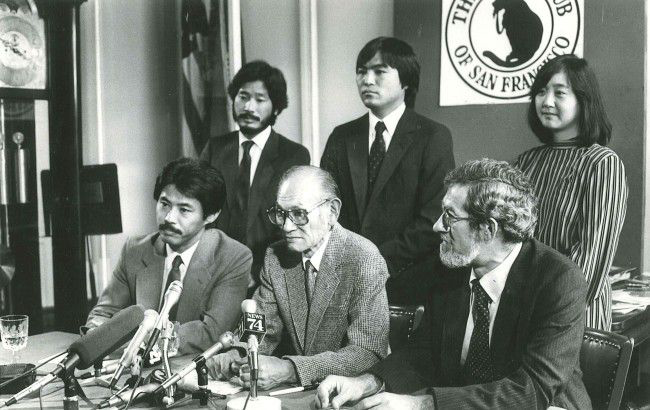When
Wednesday, October 26, 2022 5:00PM - 6:00PM CDT
Where
University of Houston Law Center
4170 Martin Luther King Blvd
Room 311
Houston, TX
77204-6060
Event Registration
| Ticket Type | Price | |
|---|---|---|
| General Admission | Free | |
|
||
Event Details

Lorraine K. Bannai is standing behind Peter Irons, who co-discovered the exonerating evidence. Donald K. Tamaki is standing opposite her with the savage beard, behind Dale Minami. Fred Korematsu is front and center.
Eighty years ago, President Franklin Roosevelt issued Executive Order 9066, ordering the incarceration of all Japanese Americans in the purported interest of national security. Three men challenged incarceration and curfews up to the Supreme Court: Gordon Hirabayashi, Min Yasui, and Fred Korematsu. As many know, their challenges were unsuccessful, and Executive Order 9066 was deemed constitutional in opinions sometimes considered as notorious as Dred Scott and Plessy v. Ferguson. But four decades later, the efforts of researchers and a touch of serendipity led to the discovery of evidence, including a presumed-destroyed War Department report, that revealed the government intentionally presented false charges of Japanese American disloyalty and espionage to the Supreme Court.
The revelations reached the west coast and inspired a group of young attorneys to represent Gordon Hirabayashi, Fred Korematsu, and Minoru Yasui and organize pro bono legal teams to file petitions for a writ of error coram nobis, a somewhat obscure procedure used to correct a fundamental error of fact in a trial. These cases—whose five year journey would parallel and sometimes mesh with the Japanese American Redress Movement effort to seek reparations in Congress—were widely publicized and came to hold great symbolic value for the Japanese American community.
Join us on Wednesday, October 26, 2022, for a discussion with Don Tamaki and Lorraine Bannai, two of Fred Korematsu's coram nobis attorneys. Law students especially are invited to learn about their experiences representing the defendant of one of the most infamous Supreme Court cases in legal history--and about how a handful of devoted and creative lawyers managed to uncover and redress a historic wrong. Dinner will be served, and attendance is free and open to the public.
Hosted by the American Constitution Society UHLC Student Chapter and the Houston Lawyer Chapter, and the UHLC Asian Law Students Association.
Generously sponsored by O'Melveny & Myers LLP and the Asian American Bar Association of Houston.
Featuring
Lorraine K. Bannai, Professor Emeritus and Director Emeritus of theFred T. Korematsu Center for Law and Equality, Seattle University School of Law
Donald K. Tamaki, Managing Partner, Minami Tamaki
*******************************************************************************************************************************************************************************************
MATERIALS:
- April 1943 Memo from Ed Ennis, DOJ's director of alien enemy control unit. Ennis documented his dissent to the government's actions in a series of memos, including this one, where he described Japanese Americans as largely loyal to the United States and advocated for individualized punishment for any who may not be. Ennis eventually advocated against internment and joined the ACLU, where he eventually became president.
- February 1944 Memo from Ed Ennis. This memo reflects Ennis's awareness that General DeWitt and the War Department have misrepresented at least certain evidence supporting Japanese disloyalty and that the War Department's report was withheld from the DOJ until its publication.
- September 1944 Memo from Ed Ennis. Ennis described the dispute between the DOJ and the War Department over a footnote in the brief to the Supreme Court in Korematsu. Ennis sought to keep in a footnote that the DOJ possessed information that conflicted with General DeWitt and the War Department's final report. He calls on the DOJ's "ethical obligation" to maintain candor to the Court, as "the War Department has published a history of the evacuation containing important misstatements of fact, including imputations and inferences that the inaction and timidity of this Department made the drastic action of evacuation necessary."
- October 1982 Letter from Justice Arthur Goldberg. Former Justice Goldberg, a member of the Commission on Wartime Relocation and Internment of Civilians, wrote to express concern about reopening the wartime cases. He discouraged the coram nobis teams from proceeding, as it would be "fruitless" and as Korematsu was already "thoroughly discredited."
- Six-minute Documentary - "Ed Ennis: The Case of the Missing Footnote and Japanese Incarceration." Ennis was in charge of preparing the government’s brief for Korematsu v. United States. Contrary to the US military claim, Ennis concluded that Japanese Americans were not engaged in subversive activity based on numerous US intelligence reports. He included a footnote in the government’s brief to inform the court of findings of the US intelligence agencies. US Solicitor General Charles Fahey removed the footnote and subsequently provided a knowingly false argument before the US Supreme Court. Ennis is remembered as a whistle-blower who took actions to uphold the truth and the rule of law.
- Six-minute Documentary - "Aiko Herzig-Yoshinaga: Discovery of Government Misconduct." Aiko Herzig-Yoshinaga was a researcher who uncovered "Final Report on Japanese Evacuation from the West Coast," which explicitly stated that intelligence sources agreed Japanese Americans posed no threat to U.S. security. That document provided undisputed evidence that US military leaders and government officials provided false testimony to the courts and lied to the public to justify the incarceration of 120,000 Japanese Americans. Her discovery provided the evidence to reverse the over 40-year old criminal convictions of Gordon Hirabayashi, Fred Korematsu, and Min Yasui.



